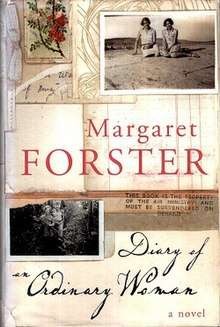Diary of an Ordinary Woman
Diary of an Ordinary Woman is a novel by Margaret Forster, framed as an "edited" diary of a fictional woman who lives through most of the major events of the 20th century, covering the years 1914 to 1995.[1][2] So realistic that many readers believed it to be an authentic diary,[2] it is one of Forster's best-known novels.[1][2][3][4]
 | |
| Author | Margaret Forster |
|---|---|
| Country | United Kingdom |
| Language | English |
| Genre | Novel |
| Publisher | Chatto & Windus |
Publication date | 6 March 2003 |
| Media type | Print (Hardback) |
| Pages | 420 pp |
| ISBN | 0-7011-7412-9 |
| OCLC | 51914252 |
Martin Chilton, writing in The Daily Telegraph, describes it as an "intermittent record of a quiet life dominated by the fact, the threat and the fear of war" and considers its main theme to be the cost of war.[1]
Plot
From the age of thirteen, on the eve of the Great War, Millicent King keeps her journals in a series of exercise books. The diary records the dramas of everyday life in an ordinary English family touched by war, tragedy, and money troubles in the early decades of the century. She struggles to become a teacher, but wants more out of life. From bohemian literary London to Rome in the twenties, her story moves on to social work and the build-up to another war, in which she drives ambulances through the bombed streets of London. She has proposals of marriage and secret lovers, ambition and optimism, but then her life is turned upside down once more by wartime deaths.
References
- Chilton, Martin (8 February 2016), "Georgy Girl author Margaret Forster dies, aged 77", The Telegraph, retrieved 9 February 2016
- Ruth Gorb (8 February 2016), "Margaret Forster obituary", The Guardian, retrieved 9 February 2016
- "Author Margaret Forster dies from cancer aged 77", BBC, 8 February 2016, retrieved 8 February 2016
- Margaret Forster: Biography, British Council, retrieved 10 February 2016